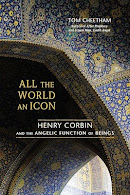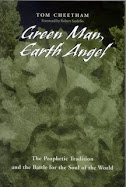"...the Imagination (or love, or sympathy, or any other sentiment) induces knowledge, and knowledge of an 'object' which is proper to it..."
Henry Corbin (1903-1978) was a scholar, philosopher and theologian. He was a champion of the transformative power of the Imagination and of the transcendent reality of the individual in a world threatened by totalitarianisms of all kinds. One of the 20th century’s most prolific scholars of Islamic mysticism, Corbin was Professor of Islam & Islamic Philosophy at the Sorbonne in Paris and at the University of Teheran. He was a major figure at the Eranos Conferences in Switzerland. He introduced the concept of the mundus imaginalis into contemporary thought. His work has provided a foundation for archetypal psychology as developed by James Hillman and influenced countless poets and artists worldwide. But Corbin’s central project was to provide a framework for understanding the unity of the religions of the Book: Judaism, Christianity and Islam. His great work Alone with the Alone: Creative Imagination in the Sufism of Ibn ‘Arabi is a classic initiatory text of visionary spirituality that transcends the tragic divisions among the three great monotheisms. Corbin’s life was devoted to the struggle to free the religious imagination from fundamentalisms of every kind. His work marks a watershed in our understanding of the religions of the West and makes a profound contribution to the study of the place of the imagination in human life.Search The Legacy of Henry Corbin: Over 800 Posts
Wednesday, May 20, 2009
Henry Corbin & (North) American Poetry - Part 3
 Robin Blaser (1925-2009) was a close friend of Robert Duncan (see this earlier post) and Jack Spicer. Two volumes of his important work have recently been published by the University of California Press:
Robin Blaser (1925-2009) was a close friend of Robert Duncan (see this earlier post) and Jack Spicer. Two volumes of his important work have recently been published by the University of California Press:The Holy Forest: Collected Poems of Robin Blaser
The Fire: Collected Essays of Robin Blaser
Photograph by Kenneth Taranta
An untitled poem from Oh! (2004) begins with an epigraph from Henry Corbin. This marvelous poem seems to me to inhabit a space near the heart of Corbin's message:
'abstract monotheism and monism, which is its secularization as social philosophy,
reveal a common totalitarian trend' - Corbin
simplified mind
generalized human nature
freedom as aggregate
public without the private
source of witnessing
this perpetual interchange
of heavenish and hellish
exhalations
oh, I ask you in my grandmother's
phrase, 'be sensible'
where is the power of the heart -
in your breast - damn you -
not up there floating
like a careless alphabet
think of a real lemon
which is very intelligent
test everything everywhere
by your own physical event
then hang on to the heart of it
we're all lemons
(in The Holy Forest, 500)
In his long essay "The Practice of Outside - For Jack Spicer," (Reprinted in The Fire, 113-63) Blaser cites Corbin twice. On page 123 he references Corbin's discussion of the cosmic crypt and the Stranger and the Guide in Avicenna and the Visionary Recital (16 ff). On p156 he writes:
"For Jack's work, as for all others in which love is a commotion of the real, love includes an anticipation of 'something that is still absent' (Corbin 155)."
The reference is to Creative Imagination in the Sufism of Ibn 'Arabi. Corbin is speaking of the Dialectic of Love and the figure of the Divine Sophia in Ibn 'Arabi. He writes:
"...whether the Lover tends to contemplate the beloved being, to unite with that being, or to perpetuate its presence, his love strives always to bring into existence something which does not yet exist in the Beloved... As the Koran verse "He will love them and they will love Him" suggests to [Ibn 'Arabi] the word love never ceases to anticipate something that is still absent, something deprived of being. Just as we speak of of a Futurum resurrectionis, we must speak of a Futurm amoris. Thus the experience of mystic love, which is a conjunction of the spiritual and the physical, implies that imaginative Energy, or creative Imagination, the theory of which plays so large a part in the visionary experience of Ibn 'Arabi. As organ of the transmutation of the sensible, it has the power to manifest the 'angelic function of beings.' " (155).
 Robin Blaser and the Angel. From the Toronto Globe&Mail here. See the full Obituary.
Robin Blaser and the Angel. From the Toronto Globe&Mail here. See the full Obituary.
Subscribe to:
Post Comments (Atom)





No comments:
Post a Comment